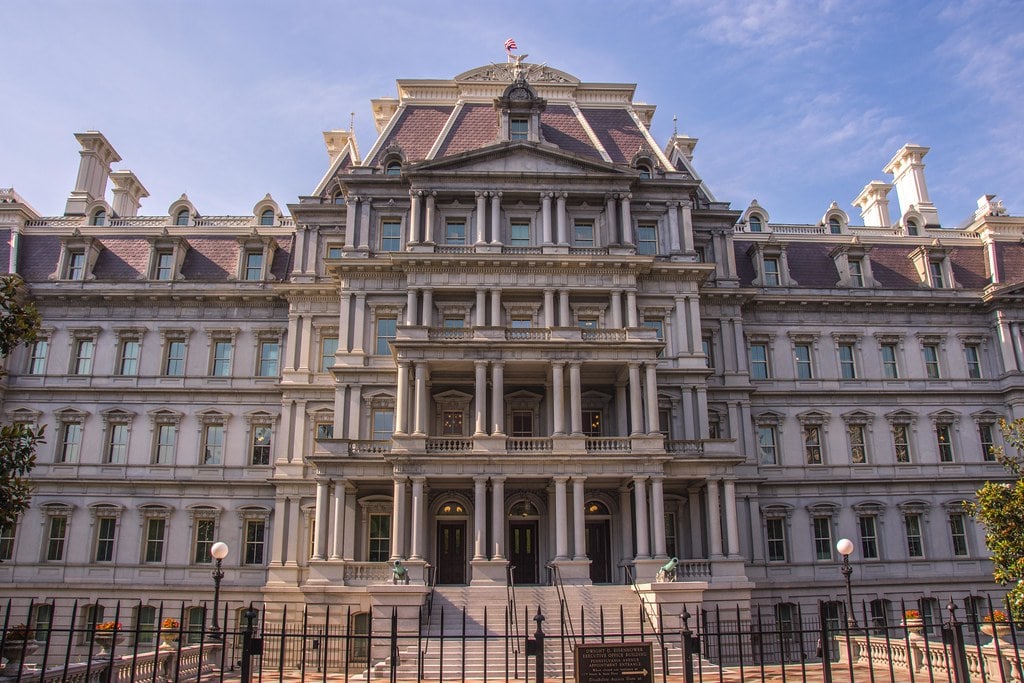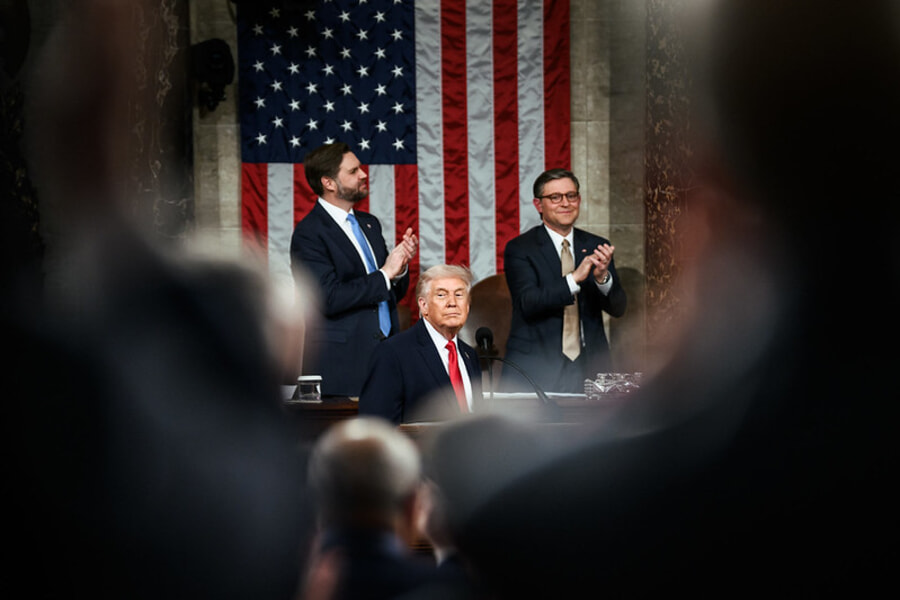Trump Is Usurping Congress’s Power of the Purse

The Trump administration’s recent efforts to impound congressional appropriations create a fundamental challenge to Congress’s constitutional power of the purse (“No Money shall be drawn from the Treasury, but in Consequence of Appropriations made by Law”). Unapproved rescissions and other tools have led to money no longer being available for its enacted purposes. While terms such as “impoundment” and “rescission” are not well known or understood by most people even within the federal government, much less across the country, the bottom line is that funding specified in legislation passed by elected representatives and signed into law by the president is increasingly at risk of not being spent consistent with the law.
Impoundment involves actions or inactions taken by the executive branch to preclude spending money designated by law for specific purposes (appropriations). The Office of Management and Budget’s (OMB’s) annual guidance to executive departments on budget preparations and execution (Circular No. A-11) previously defined impoundment as “any Executive Branch action or inaction that withholds or precludes the obligation or expenditure of budget authority.” However, OMB’s 2025 version of this circular issued by Director Russ Vought in August removed that definition, noting that, “The Impoundment Control Act of 1974 applies only to proposals to rescind funds and proposals to defer funds.”
Per OMB’s 2025 circular, “A rescission proposal is a proposal by the President to permanently reduce budgetary resources using the procedures specified in Title X of the Congressional Budget and Impoundment Control Act of 1974 [ICA].” Those procedures include explicit requirements for the president’s transmittal to Congress proposing a rescission and congressional approval via a rescission bill within the 45-day period prescribed by the ICA for all or part of the amount proposed to be rescinded. When the Trump administration proposed $9.4 billion in rescissions in June, Congress approved most but not all of the proposed rescissions by the prescribed deadline in July. In this case, the administration sought congressional approval, consistent with the provisions of the ICA, and implemented only the rescissions that received the explicit consent of Congress in legislation.
However, OMB’s 2025 circular included key changes asserting greater power to rescind, withhold, or delay the use of congressional appropriations. It states that “[a]mounts proposed for rescission may be withheld for 45 days of continuous session of the Congress, regardless of when during the fiscal year the rescission is proposed” (emphasis added). This explains the administration’s claim to so-called pocket rescission authority, whereby the president proposes a rescission with fewer than 45 days remaining before the funding expires (as he did with his $4.9 billion rescissions package in August), making congressional action moot because the withheld foreign assistance funding expired at the end of September. The combination of OMB’s reading of the ICA and the timing of its rescission proposal so late in the fiscal year achieved the administration’s goal of impounding the funds without depending on congressional approval. The Supreme Court allowed the pocket rescissions to proceed with a preliminary ruling that the plaintiffs (foreign assistance organizations) did not have legal standing to sue, but this unsigned ruling did not definitively rule on the legality of pocket rescissions, noting that it “should not be read as a final determination on the merits.”
Pocket rescissions arguably violate the spirit, if not the letter, of the ICA’s requirements for presidential proposals followed by congressional action. The U.S. Government Accountability Office (GAO) has opined that pocket rescissions are not legal because “the ICA does not permit the withholding of funds through their date of expiration.” OMB disagrees, arguing that the ICA does not preclude pocket rescissions. While OMB’s 2025 circular explicitly states, “A rescission entails the enactment of legislation to reduce budget authority … previously provided by law, prior to the time when the authority would otherwise expire” (emphasis added), a pocket rescission does not entail the enactment of legislation. Indeed, a pocket rescission neither depends on congressional review and approval nor requires OMB to release the money before it expires even if Congress were to disapprove. Given ongoing debate about the legality of pocket rescissions, Congress should amend the ICA to clarify or close a loophole that has enabled the president to rescind money without congressional review and approval (by proposing a rescission with fewer than 45 days before the funding expires).
Another significant change in OMB’s 2025 circular is in the description of deferrals. As the circular notes, “A deferral is defined in the [ICA] as withholding or delaying the obligation or expenditure of budget authority, or any other type of Executive Branch action or inaction that effectively precludes the obligation or expenditure of budget authority.” OMB’s 2025 circular no longer includes in its description “with the intent of using the funds before they expire.” Also, the 2025 circular adds the sentence below explicitly excluding certain delays from OMB’s interpretation of deferrals:
Given the overbroad nature of the statutory definition, the Act has long been interpreted to exclude from its definition of deferral: (1) the lawful exercise of apportionment and allotment authority under the Antideficiency Act, and (2) delays in obligations or expenditures that are programmatic in nature, which includes, among other things, the time necessary to establish a new program, change the scope or design of existing programs, or develop policies concerning program implementation to align with Administration policy.
The interpretation of deferrals is critical given statutory limitations and requirements. By law, deferrals are permissible only “(1) to provide for contingencies; (2) to achieve savings made possible by or through changes in requirements or greater efficiency of operations; or (3) as specifically provided by law. No officer or employee of the United States may defer any budget authority for any other purpose” (emphasis added). Moreover, the president is required by statute to communicate proposed deferrals to Congress in a special message, and deferrals may not extend beyond the end of the fiscal year. Given these statutory limitations and requirements governing deferrals, administrations rarely propose them and acknowledge that deferrals for policy reasons, also known as “policy deferrals,” do not fit into any of the three categories above and are thus not permitted by law. Hence, the importance of OMB’s exclusions in its interpretation of deferrals.
This interpretation is consistent with OMB’s increasingly expansive use of apportionments to withhold or delay obligations while asserting that such delays do not constitute deferrals. Per Circular A-11, an apportionment is a legally binding “OMB-approved plan to use budgetary resources …, and obligations and expenditures (disbursements) that exceed an apportionment are a violation of, and are subject to reporting under, the Antideficiency Act.” Having served as OMB’s senior career official in the National Security Division for 11 years, I reviewed and signed thousands of apportionments. My understanding of permissible delays in obligations was generally consistent with the interpretation included above, but it was always guided by the caveat of ensuring funds could be used by the respective department or agency before they expired and consistent with the purposes for which they were appropriated by Congress (or reprogrammed consistent with enacted reprogramming authorities).
A set of apportionments involving military assistance to Ukraine during the first Trump administration underscored this point. As described in detail in testimony before the House Permanent Select Committee on Intelligence on Nov. 16, 2019, in the summer of 2019 my supervisor at OMB directed me to put a hold on security assistance to the government of Ukraine via OMB’s apportionment authority. I was not told a reason for the hold, other than that the direction came from the president. Consistent with long-standing OMB practice, as a deputy associate director within one of OMB’s Resource Management Offices, I was the OMB official responsible for signing apportionments for departments and agencies overseen by OMB’s National Security Division, which I had led since December 2013. Given my concerns about the ICA, I initially refused to sign the apportionment as directed because of my questions and concerns about the legality of such a hold vis-a-vis the ICA. I subsequently spent several days working with OMB’s Office of General Counsel (OGC) and the Department of Defense’s acting under secretary for the comptroller to develop an apportionment footnote that paused additional Ukraine Security Assistance Initiative (USAI) obligations but only temporarily based on guidance from OMB OGC and the concurrence of the Defense Department that such a footnote did not violate the ICA. The footnote on that July 25, 2019, apportionment read:
Amounts apportioned, but not yet obligated as of the date of this reapportionment, for the Ukraine Security Assistance Initiative (Initiative) are not available for obligation until August 5, 2019, to allow for an interagency process to determine the best use of such funds. Based on OMB’s communication with [the Defense Department (DOD)] on July 25, 2019, OMB understands from the Department that this brief pause in obligations will not preclude DOD’s timely execution of the final policy direction. DOD may continue its planning and casework for the Initiative during this period.
Two key components of that apportionment footnote were that (a) it was limited to a relatively brief period of time and (b) the Defense Department had affirmed that this brief pause in obligations would not preclude timely execution. In other words, the Defense Department would still be able to obligate these appropriations before they expired at the end of September. Per OMB OGC’s guidance and the Defense Department’s concurrence, these two key components were designed to ensure the apportionment would not violate the ICA. Given that assurance, I signed the apportionment.
The apportionment restriction was due to expire on Aug. 5, 2019. However, on July 30, 2019, my immediate supervisor, OMB’s program associate director (PAD) for National Security Programs, a political appointee, informed me that he and then-Acting Director Vought had decided to reassign the delegation of apportionment authority for National Security Programs from the deputy associate director (career senior executive service) level to the PAD (political) level, and henceforth the PAD would be approving apportionments. This change in delegation was the director’s prerogative, but highly unusual.
The PAD for National Security Programs proceeded to direct staff to prepare multiple successive apportionments that continued to place holds on the Defense Department obligating USAI funds. The next two such apportionments maintained the identical footnote I had coordinated with OMB OGC and the Defense Department, with just a change in the August end date. However, starting with the Aug. 20 apportionment, the footnote no longer included “OMB understands from the Department that this brief pause in obligations will not preclude DOD’s timely execution of the final policy direction” because by that point, the Defense Department would no longer provide that assurance. The successive apportionment holds lasted until Sept. 12, 2019, by which time news reports had begun to break about allegations of the president soliciting the interference of Ukraine’s government to benefit his reelection that would ultimately lead to the House of Representatives’s impeachment inquiry.
GAO subsequently issued a written decision concluding that OMB had violated the ICA by withholding USAI funds for policy reasons. OMB disagreed, arguing that its multiple holds on obligating USAI funds constituted a programmatic delay, which is allowed under the ICA. OMB defended its actions as appropriate “to ensure that funds were not obligated prematurely in a manner that could conflict with the President's foreign policy.”
Whereas the guidance I received in 2019 was to limit any delay in obligations to a brief period of time and confirm that such a delay would not preclude timely execution, the more expansive language in OMB’s 2025 circular allows for delays that could be quite extensive, including to “develop policies concerning program implementationto align with Administration policy” (emphasis added). Indeed, in recent examples, such as those cited in a New York Times article, OMB in essence creates its own line-item veto for detailed “spending plans” required from departments and agencies before they can legally obligate funding.
By making obligations of targeted funding subject to such advance approval, OMB has asserted authority to pause or prohibit certain uses of appropriations while claiming in its 2025 circular that such programmatic and policy-alignment delays in obligations or expenditures do not constitute a deferral, which would require notification to Congress in a special message. The risk is that the administration could exploit such apportionment restrictions to delay substantial portions of enacted appropriations long enough to make them vulnerable to a pocket rescission precluding obligation before the funding expires. In addition, even in the absence of a pocket rescission, if OMB effectively precludes select obligations late into the fiscal year, agencies may not be able to fully obligate the funding before it expires. Recent analyses of administration apportionments and federal financial data have highlighted these risks. For this reason, it behooves congressional committees to receive regular updates on approved spending plans and unobligated funds due to expire since they are vulnerable to pocket rescissions and agencies’ inability to obligate them.
Enacted appropriations have always established a ceiling on the amounts agencies can obligate per the Antideficiency Act, and agencies will generally leave an unobligated cushion in some accounts (typically less than 1 percent) to ensure they do not risk inadvertently violating the act. However, the risks associated with a more aggressive approach to impounding funds is that there is no floor on executing enacted appropriations. If the administration delays obligations so long that they expire or are precluded from obligation without any congressional concurrence, using a pocket rescission for instance, then the effective floor for appropriations an administration does not support becomes zero.
In the first Trump administration, OMB’s General Counsel Mark Paoletta sent letters to GAO in December 2019 and January 2021 concerning the withholding of Ukraine security assistance. OMB Director Vought and his general counsel also sent a letter to the chairman of the House Budget Committee in January 2021 on OMB’s authorities to manage executive branch spending. These three letters provide insights into OMB’s current approach given that Vought is once again the director and Paoletta has also returned as general counsel. Their past arguments supporting OMB’s use of its authorities “aggressively, but lawfully” included the following key points: As Paoletta noted, “The President of the United States is required to ‘take Care that the Laws be faithfully executed.’ U.S. Const. Art. II, Sec. 3. As part of carrying out this duty, the Executive branch must ensure that Federal agencies spend appropriated funds in an efficient and effective manner, consistent with the purpose for which the funds were appropriated.” He added, “[I]t is inherent to OMB’s apportionment authority that not all appropriated funds must be immediately available for obligation. Pauses in obligational authority are necessary for proper stewardship of taxpayer funds.” Vought and Paoletta’s January 2021 letter emphasized that, “[c]ontrary to GAO’s view, the ICA’s bar on ‘policy deferrals’ does not mean that the Executive Branch may never pause spending to make policy decisions.” Indeed, they argued, “If compliance with non-binding directives from Member[s] of Congress and their staff to ‘hold’ funds is not a deferral under the ICA, then a President deciding to temporarily pause spending so that he can determine the most appropriate and efficient uses of the funds within his statutory or constitutional authorities is likewise not a deferral.”
More recently, Vought and Paoletta have argued that the ICA is unconstitutional because, as Paoletta has asserted, it usurps the president’s “longstanding executive impoundment power,” which “is grounded in … the Constitution and supported by centuries of history and practice.” Nonetheless, under their leadership, OMB has leveraged the ICA’s procedures to propose $9.4 billion in rescissions in early June 2025 and to withhold $4.9 billion via a pocket rescission until the money expired in September 2025. Moreover, OMB’s 2025 Circular A-11 states explicitly that “[r]escission proposals and deferrals are subject to the requirements of [the ICA].”
In the aforementioned letters from Vought and Paoletta during the first Trump administration, OMB also explicitly acknowledged “the ICA’s prohibition on deferring funds in cases where the Executive Branch disagrees with the policy of a statute[.]” As Paoletta wrote, “[U]nder the ICA the President may not defer funds simply because he disagrees with the policy underlying a statute (assuming that the statute could be executed consistent with the President's constitutional authorities).” He added: “Policy deferrals (which are not permitted by the ICA) occur when the intent behind withholding funds is contrary to the intent of the statute that provided the funds.” Vought and Paoletta also stated that “[g]ood government demands transparency, efficiency, and accountability in the administration of government programs.”
Given these acknowledgments, the central question for the current administration and Congress is whether executive branch actions or inactions that withhold or preclude the obligation or expenditure of funds reflect policy disagreements with the intended statutory use of those appropriations. If so, OMB leadership’s own past statements acknowledge that such actions or inactions are prohibited. For instance, if the executive branch finds ways to achieve the same programmatic goals more efficiently with fewer resources, then the remaining funds should be reprogrammed using statutory authorities or proposed for rescission. However, the executive branch is not permitted to withhold resources simply because it disagrees with the programs funded in legislation passed by Congress and enacted by the president. In addition, the transparency necessary for good government includes abiding by the law requiring OMB to post approved apportionments and associated footnotes on a public website.
In contrast to established procedures such as those in the ICA that require legislative approval for proposed rescissions, impoundments in the absence of congressional consent undermine the force of law for enacted appropriations legislation. Congressional legislation reflects the will of a majority of the House of Representatives and, for appropriations bills, typically at least 60 percent of the Senate (since, under current Senate practice, appropriations bills invariably require a majority sufficient to overcome a filibuster). Impoundments also increase the potential for government shutdowns insofar as they call into question the integrity of agreed-upon compromises on appropriations for both parties’ priorities.
The question is whether Congress will reassert its authorities, consistent with the separation of powers under the Constitution, to prevent current and future administrations from usurping or abrogating congressional prerogatives. The failure of Congress to respond risks diminishing one of its most important powers, thereby ceding what the framers of the Constitution envisioned as an essential bulwark for the separation of powers—the vigorous defense by each branch of its respective authorities. As James Madison wrote in Federalist Paper #51:
[T]he great security against a gradual concentration of the several powers in the same [branch], consists in giving to those who administer each [branch] the necessary constitutional means and personal motives to resist encroachments of the others.
This risk of presidential encroachment on Congress’s power of the purse is not limited to the current administration. A failure to respond to this important moment will establish precedents for successive administrations of both parties.
What actions could Congress take to protect and reassert its authorities? When Congress was concerned in 2019 that the administration’s holds on Ukraine security funding might prevent the money from being fully obligated before it expired, Congress reappropriated the funds as part of the Continuing Appropriations Act in late September 2019, thereby extending the time the money would be available before it expired. While Congress could do the same, for example, for pocket rescissions that it does not approve, such a fix creates legislative challenges when the burden should not be on Congress to enact the same funding twice and when Congress struggles to pass appropriations bills at all, as the most recent government shutdown starkly demonstrates.
There are potential measures to preclude impoundments that are not approved by Congress. For example, Congress could extend the availability of funding that was already subjected to a pocket rescission or that the administration otherwise withheld from obligation until it expired. Section 118 of the House minority’s proposed continuing resolution included such a provision.
Congress could also close the loophole in the ICA to prevent pocket rescissions. For example, Congress could establish a statutory minimum period of time for proposed rescissions in advance of funding expiration (though a legislative fix may require a veto-proof majority). This would ensure Congress has sufficient time to approve or disapprove the proposed rescissions and that agencies have sufficient time to obligate withheld funding that is not approved for rescission before it expires. Section 119 of the House minority’s proposed continuing resolution included this type of provision.
Section 119 also included a provision to turn off the ICA’s fast-track procedures in order to protect the integrity of bipartisan agreements enacted in appropriations legislation. Preventing simple majorities in Congress from rescinding funding would make legislative requirements for enacting rescissions similar to those for enacting appropriations. For example, annual appropriations bills often include rescissions proposed by Congress or the administration and subject to the normal legislative process.
Congress could amend the ICA to extend legal standing to parties other than the comptroller general in lawsuits to enforce the ICA and appropriations laws under the Administrative Procedure Act. While the ICA already includes a disclaimer that “[n]othing contained in this Act … shall be construed as … affecting in any way the claims or defenses of any party to litigation concerning any impoundment,” this issue remained a point of contention in the Supreme Court’s preliminary ruling on pocket rescissions.
Another avenue Congress could take is including more directive language in appropriations bills requiring apportionment and obligation within certain time frames, for which there are precedents in past legislation. For some appropriations and programs, agencies have the ability to fully obligate their appropriations without a risk of violating the Antideficiency Act, so legislation could effectively make those amounts both a floor and a ceiling. What’s more, Congress could rely more heavily on specific language and tables incorporated into legislation by reference to stipulate the uses of enacted appropriations—a practice commonly used by congressional appropriators from both parties.
Ultimately, however, in the absence of legal mechanisms to ensure accountability and enforcement, Congress will have to be prepared to exercise its power of the purse over administration priorities if there is a failure to respect enacted appropriations. The challenge for both parties in Congress is how to prevent the current and future presidents from usurping the power of the purse by bolstering, in Madison’s words, the constitutional means and personal motives to resist encroachments.





